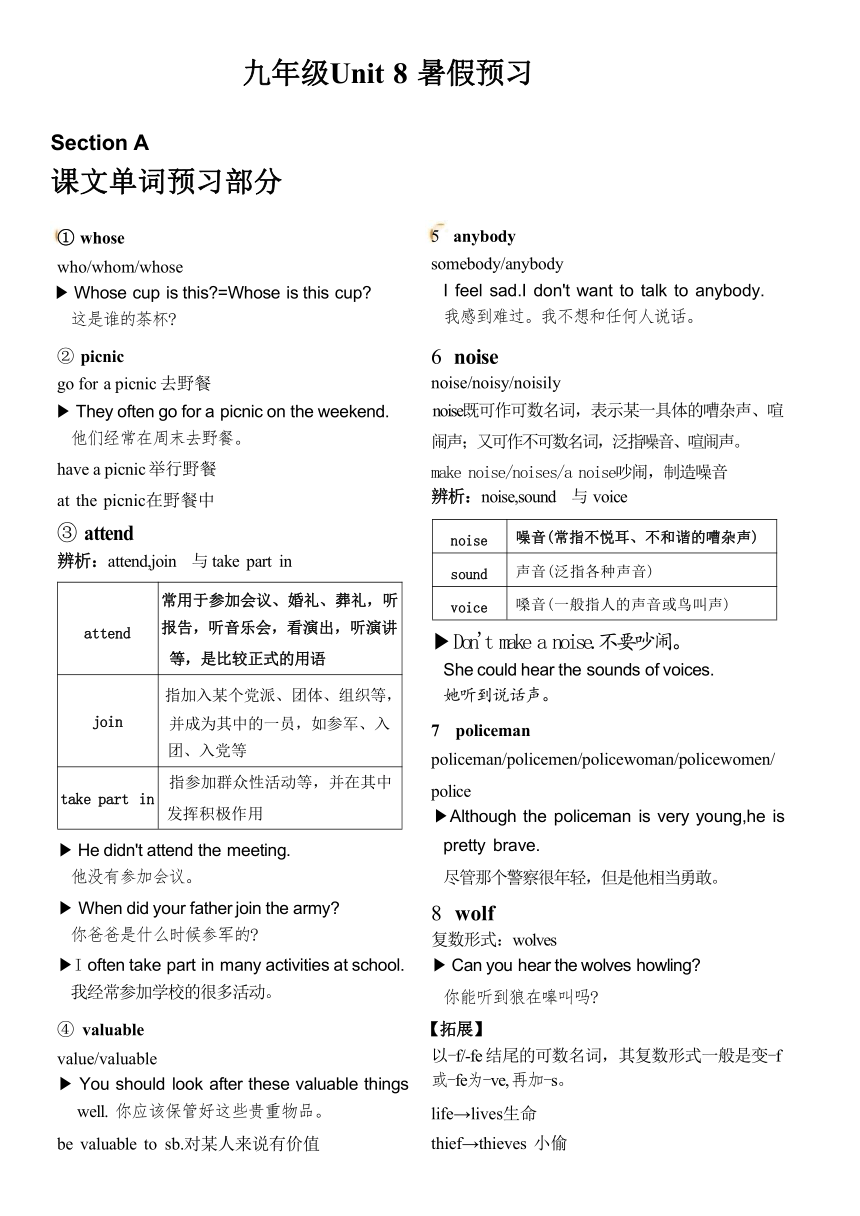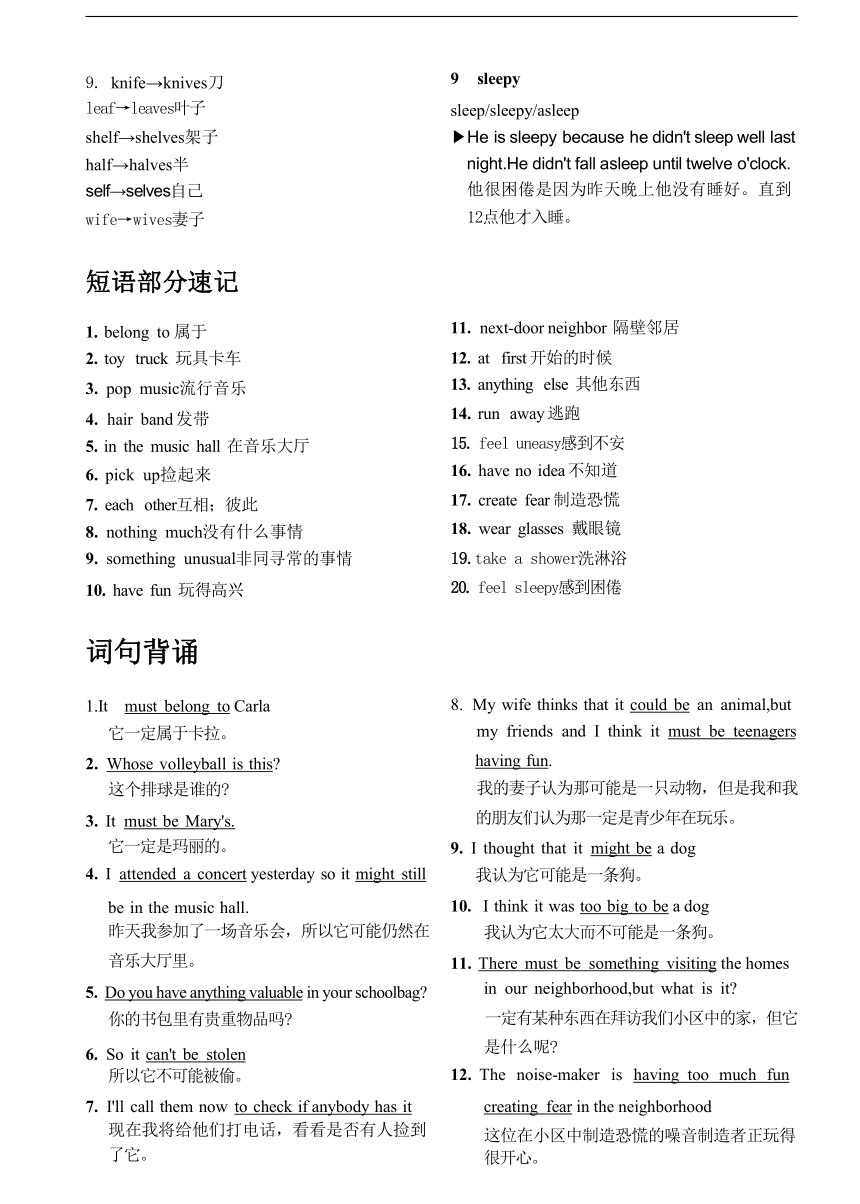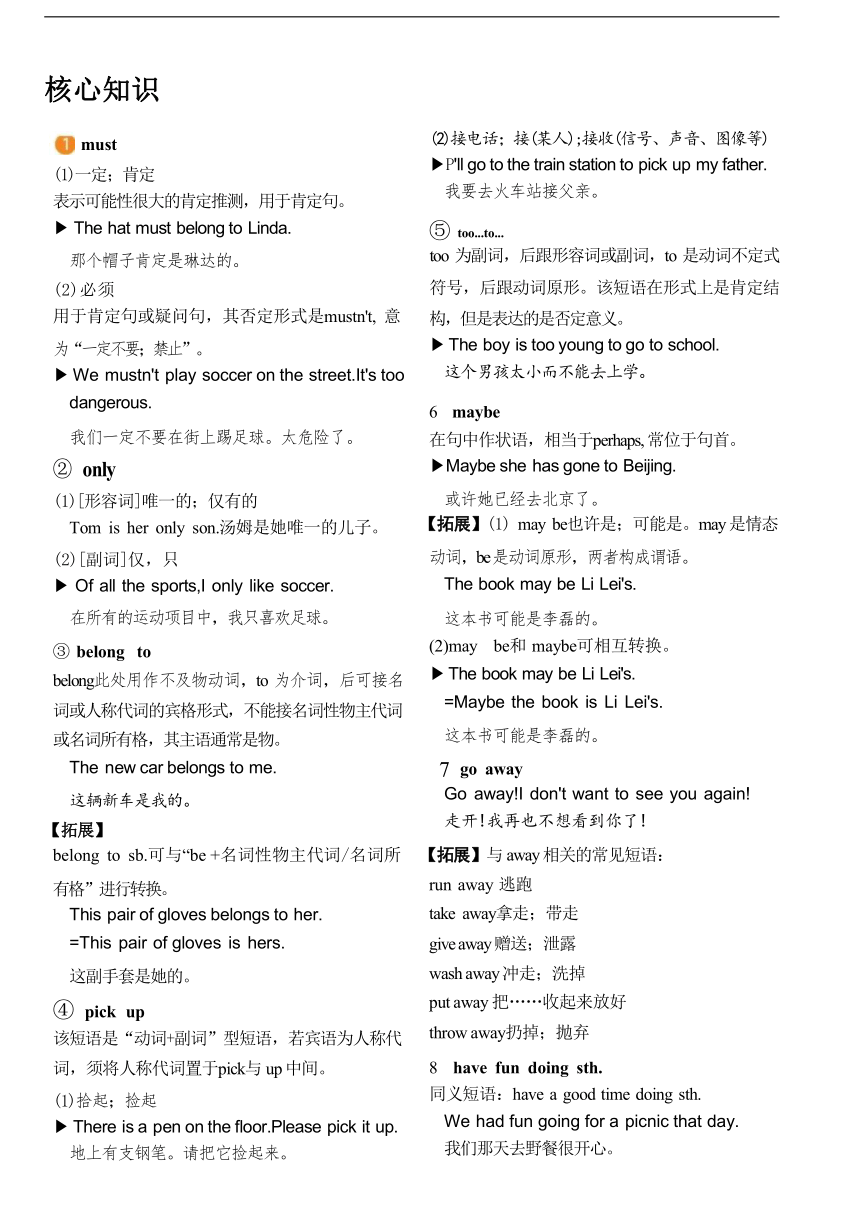2024-2025学年人教版九年级全册Unit 8 It must belong to Carla.知识点讲义
文档属性
| 名称 | 2024-2025学年人教版九年级全册Unit 8 It must belong to Carla.知识点讲义 |

|
|
| 格式 | docx | ||
| 文件大小 | 64.6KB | ||
| 资源类型 | 教案 | ||
| 版本资源 | 人教新目标(Go for it)版 | ||
| 科目 | 英语 | ||
| 更新时间 | 2024-06-28 00:00:00 | ||
图片预览



文档简介
九年级Unit 8 暑假预习
Section A
课文单词预习部分
① whose
who/whom/whose
Whose cup is this =Whose is this cup 这是谁的茶杯
② picnic
go for a picnic 去野餐
They often go for a picnic on the weekend. 他们经常在周末去野餐。
have a picnic 举行野餐
at the picnic在野餐中
③ attend
辨析:attend,join 与 take part in
attend 常用于参加会议、婚礼、葬礼,听 报告,听音乐会,看演出,听演讲 等,是比较正式的用语
join 指加入某个党派、团体、组织等, 并成为其中的一员,如参军、入 团、入党等
take part in 指参加群众性活动等,并在其中 发挥积极作用
He didn't attend the meeting. 他没有参加会议。
When did your father join the army 你爸爸是什么时候参军的
I often take part in many activities at school. 我经常参加学校的很多活动。
④ valuable
value/valuable
You should look after these valuable things well. 你应该保管好这些贵重物品。
be valuable to sb.对某人来说有价值
5 anybody
somebody/anybody
I feel sad.I don't want to talk to anybody. 我感到难过。我不想和任何人说话。
6 noise
noise/noisy/noisily
noise既可作可数名词,表示某一具体的嘈杂声、喧
闹声;又可作不可数名词,泛指噪音、喧闹声。
make noise/noises/a noise吵闹,制造噪音 辨析:noise,sound 与 voice
noise 噪音(常指不悦耳、不和谐的嘈杂声)
sound 声音(泛指各种声音)
voice 嗓音(一般指人的声音或鸟叫声)
Don't make a noise.不要吵闹。
She could hear the sounds of voices. 她听到说话声。
7 policeman
policeman/policemen/policewoman/policewomen/
police
Although the policeman is very young,he is
pretty brave.
尽管那个警察很年轻,但是他相当勇敢。
8 wolf
复数形式:wolves
Can you hear the wolves howling
你能听到狼在嗥叫吗
【拓展】
以-f/-fe 结尾的可数名词,其复数形式一般是变-f 或-fe为-ve, 再加-s。
life→lives生命
thief→thieves 小偷
knife→knives刀
leaf→leaves叶子
shelf→shelves架子
half→halves半
self→selves自己
wife→wives妻子
短语部分速记
1. belong to 属于
2. toy truck 玩具卡车
3. pop music流行音乐
4. hair band 发带
5. in the music hall 在音乐大厅
6. pick up捡起来
7. each other互相;彼此
8. nothing much没有什么事情
9. something unusual非同寻常的事情
10. have fun 玩得高兴
词句背诵
9 sleepy
sleep/sleepy/asleep
He is sleepy because he didn't sleep well last night.He didn't fall asleep until twelve o'clock. 他很困倦是因为昨天晚上他没有睡好。直到 12点他才入睡。
11. next-door neighbor 隔壁邻居
12. at first 开始的时候
13. anything else 其他东西
14. run away 逃跑
15. feel uneasy感到不安
16. have no idea 不知道
17. create fear 制造恐慌
18. wear glasses 戴眼镜
19.take a shower洗淋浴
20. feel sleepy感到困倦
1.It must belong to Carla
它一定属于卡拉。
2. Whose volleyball is this
这个排球是谁的
3. It must be Mary's.
它一定是玛丽的。
4. I attended a concert yesterday so it might still
be in the music hall.
昨天我参加了一场音乐会,所以它可能仍然在
音乐大厅里。
5. Do you have anything valuable in your schoolbag
你的书包里有贵重物品吗
6. So it can't be stolen
所以它不可能被偷。
7. I'll call them now to check if anybody has it 现在我将给他们打电话,看看是否有人捡到 了它。
8. My wife thinks that it could be an animal,but
my friends and I think it must be teenagers
having fun.
我的妻子认为那可能是一只动物,但是我和我
的朋友们认为那一定是青少年在玩乐。
9. I thought that it might be a dog
我认为它可能是一条狗。
10. I think it was too big to be a dog
我认为它太大而不可能是一条狗。
11. There must be something visiting the homes
in our neighborhood,but what is it
一定有某种东西在拜访我们小区中的家,但它
是什么呢
12. The noise-maker is having too much fun
creating fear in the neighborhood
这位在小区中制造恐慌的噪音制造者正玩得 很开心。
核心知识
must
(1)一定;肯定
表示可能性很大的肯定推测,用于肯定句。
The hat must belong to Linda.
那个帽子肯定是琳达的。
(2)必须
用于肯定句或疑问句,其否定形式是mustn't, 意
为“一定不要;禁止”。
We mustn't play soccer on the street.It's too dangerous.
我们一定不要在街上踢足球。太危险了。
② only
(1)[形容词]唯一的;仅有的
Tom is her only son.汤姆是她唯一的儿子。
(2)[副词]仅,只
Of all the sports,I only like soccer.
在所有的运动项目中,我只喜欢足球。
③ belong to
belong此处用作不及物动词,to 为介词,后可接名 词或人称代词的宾格形式,不能接名词性物主代词
或名词所有格,其主语通常是物。
The new car belongs to me.
这辆新车是我的。
【拓展】
belong to sb.可与“be +名词性物主代词/名词所
有格”进行转换。
This pair of gloves belongs to her.
=This pair of gloves is hers.
这副手套是她的。
④ pick up
该短语是“动词+副词”型短语,若宾语为人称代
词,须将人称代词置于pick与 up 中间。
(1)拾起;捡起
There is a pen on the floor.Please pick it up. 地上有支钢笔。请把它捡起来。
(2)接电话;接(某人);接收(信号、声音、图像等)
P'll go to the train station to pick up my father. 我要去火车站接父亲。
⑤ too...to...
too 为副词,后跟形容词或副词,to 是动词不定式
符号,后跟动词原形。该短语在形式上是肯定结
构,但是表达的是否定意义。
The boy is too young to go to school. 这个男孩太小而不能去上学。
6 maybe
在句中作状语,相当于perhaps, 常位于句首。 Maybe she has gone to Beijing.
或许她已经去北京了。
【拓展】(1) may be也许是;可能是。may 是情态
动词,be 是动词原形,两者构成谓语。
The book may be Li Lei's.
这本书可能是李磊的。
(2)may be和 maybe可相互转换。
The book may be Li Lei's.
=Maybe the book is Li Lei's.
这本书可能是李磊的。
7 go away
Go away!I don't want to see you again! 走开!我再也不想看到你了!
【拓展】与 away 相关的常见短语:
run away 逃跑
take away拿走;带走
give away 赠送;泄露
wash away 冲走;洗掉
put away 把……收起来放好
throw away扔掉;抛弃
8 have fun doing sth.
同义短语:have a good time doing sth.
We had fun going for a picnic that day. 我们那天去野餐很开心。
课文单词预习部分
Section B
① land
(1)[不及物动词]着陆;降落
反义短语:takeoff
When will the plane land
飞机将在什么时候降落
(2)[及物动词]使着陆,使降落
The pilot landed the plane safely.
飞行员使飞机安全降落了。
【拓展】land 还可表示名词“陆地;土地”。
on land在陆地上
② suit
(1)[名词]西服;套装
We should wear suits on weekdays.
工作日我们需要穿套装。
(2)[动词]适合
The shoes suited me fine.
鞋子很适合我。
③ express
express/expression
⑤ Britain
Britain/British
The girl comes from Britain.
那个女孩来自大不列颠。
6 receive
receive a letter from sb.
=get a letter from sb.
=hear from sb.
收到某人的来信
辨析:receive与 accept
receive 侧重于行为本身,不涉及收到者是否 愿意,是“客观上”的收到
accept 强调经过主语的考虑而接受,是“主观 上”的接受
Have you received my gift
你收到我的礼物了吗
She has decided not to accept the job.
她决定不接受这份工作。
How will you express your thanks to her
你将如何对她表达你的谢意
④ circle
(1)[名词]圆圈
She is drawing a circle.
她正在画一个圆圈。
(2)[动词]圈出
Listen and circle the words you hear.
听一听并圈出你所听到的单词。
【拓展】circle 还可表示名词“圈子,界”。
表示具有相同兴趣、职业的人形成的群体。
a circle of friends朋友圈
historian
history/historic/historical/historian
The old woman is a famous historian. 那位老太太是一位著名的历史学家。
8 leader
lead/leader
She is our leader,
她是我们的领导。
9 medical
medicine/medical
The medical team will arrive in ten minutes. 医疗队将在十分钟后到达。
purpose
the purpose of ...……的目的
No one knows the purpose of his visit. 没有人知道他来访的目的。
on purpose故意地;有意地
Was it an accident or did David do it on purpose 这个是意外呢,还是戴维故意干的
prevent
prevent ...from doing sth.
= stop/keep...from doing sth.
阻止……做某事
We should prevent him from doing silly things. 我们必须阻止他做傻事。
2 position
Do you know my position
你知道我的位置吗
the position of...……的位置
in position 就位,在正确的位置
out of position不在适当的位置
13 honor
(1)[动词]尊重;表示敬意
We should honor those heroes.
我们应该尊重那些英雄。
(2)[名词]荣幸;荣誉
It's my honor to come to the party.
能来参加晚会我倍感荣幸。
4 victory
We won a victory at last. 最后我们获得了胜利。
15 enemy
The enemy will run away. 敌人要逃跑。
6 period
a period of time一段时间
I'll stay here for a long period of time.
我要在这里待很长时间。
短语部分速记
1. run after追逐;追赶
2. catch a bus赶车
3. at the same time同时
4. arrive in 到达
5. point out 指出
6. in a certain way 以某种方式
7. prevent illness预防疾病
词句背诵
8. burial place安葬地
9. honor ancestors 纪念祖先
10. celebrate a victory 庆祝胜利
11. wait for 等待
12. go to the concert去听音乐会
13. rock music 摇滚乐
14. running shoes 跑鞋
1. He could be running for exercise.
他可能是为了锻炼正在跑步。
2. He might be running to catch a bus to work. 他可能正跑着赶公交车去上班。
3.Most agree that the position of the stones must
be for a special purpose.
大多数人赞同石头的放置方式一定是为了一个
特殊的目的。
4. Some think it might be a burial place or a place
tohonor ancestors.
有些人认为它可能是一处安葬地或一个纪念祖
先的地方。
5. Others think it was built to celebrate a victory over an enemy.其他人认为它是被建来庆祝一 场击败敌人的胜利的。
6. Most historians believe it must be almost 5,000 years old.多数历史学家认为它肯定有
几乎5000年的历史了。
核心知识
① 名词所有格
(1)名词后面加’s或以s 结尾的名词,直接在名词 的后面加’。
Ann's book 安的书
our teachers'office我们老师的办公室
(2)表示双方共有的人或物时,只在后一个名词使
用所有格形式。
Lily and Lucy's room
莉莉和露西的房间(表示房间属二人共同所有) (3)用“of +名词”表示无生命的东西的所有格。 a picture of my family 一张我的全家福
(4)有时也用’s表示无生命的东西的所有格。 today's newspaper 今天的报纸
the city's name这座城市的名字
② arrive
辨析:arrive,reach 与 get to
arrive 不及物动词 后接地点名词时,需跟介 词in或at;arrive in后 跟大地点,arrive at后跟 小地点
reach 及物动词 后直接跟地点名词
get to 动词短语 后接地点名词,多用于口 语 ; 其后跟地点副词 home,here,there等时, to要省略
We might arrive in Shanghai this Saturday. =We might reach Shanghai this Saturday. =We might get to Shanghai this Saturday. 我们可能在这个周六到达上海。
③ point out
辨析:point out,point at与 point to
point out “指出”,out是 副词 给某人指出方向、 要点或错误等
point at “指着”,at是介 词,侧重于指的 对象 指着离说话人较 近的人或事物
point to “指向”,to是 介词,侧重于指 的方向 指向离说话人较 远的人或事物
Can you point out my mistakes in my homework 你能指出我作业中的错误吗
Don't point at the old man with your pen.It's not polite.
不要用你的钢笔指着老人。那是不礼貌的。
The teacher pointed to the hill far away and
said,“Let's go there.”
老师指着远处的小山说:“让我们去那里。”
Section A
课文单词预习部分
① whose
who/whom/whose
Whose cup is this =Whose is this cup 这是谁的茶杯
② picnic
go for a picnic 去野餐
They often go for a picnic on the weekend. 他们经常在周末去野餐。
have a picnic 举行野餐
at the picnic在野餐中
③ attend
辨析:attend,join 与 take part in
attend 常用于参加会议、婚礼、葬礼,听 报告,听音乐会,看演出,听演讲 等,是比较正式的用语
join 指加入某个党派、团体、组织等, 并成为其中的一员,如参军、入 团、入党等
take part in 指参加群众性活动等,并在其中 发挥积极作用
He didn't attend the meeting. 他没有参加会议。
When did your father join the army 你爸爸是什么时候参军的
I often take part in many activities at school. 我经常参加学校的很多活动。
④ valuable
value/valuable
You should look after these valuable things well. 你应该保管好这些贵重物品。
be valuable to sb.对某人来说有价值
5 anybody
somebody/anybody
I feel sad.I don't want to talk to anybody. 我感到难过。我不想和任何人说话。
6 noise
noise/noisy/noisily
noise既可作可数名词,表示某一具体的嘈杂声、喧
闹声;又可作不可数名词,泛指噪音、喧闹声。
make noise/noises/a noise吵闹,制造噪音 辨析:noise,sound 与 voice
noise 噪音(常指不悦耳、不和谐的嘈杂声)
sound 声音(泛指各种声音)
voice 嗓音(一般指人的声音或鸟叫声)
Don't make a noise.不要吵闹。
She could hear the sounds of voices. 她听到说话声。
7 policeman
policeman/policemen/policewoman/policewomen/
police
Although the policeman is very young,he is
pretty brave.
尽管那个警察很年轻,但是他相当勇敢。
8 wolf
复数形式:wolves
Can you hear the wolves howling
你能听到狼在嗥叫吗
【拓展】
以-f/-fe 结尾的可数名词,其复数形式一般是变-f 或-fe为-ve, 再加-s。
life→lives生命
thief→thieves 小偷
knife→knives刀
leaf→leaves叶子
shelf→shelves架子
half→halves半
self→selves自己
wife→wives妻子
短语部分速记
1. belong to 属于
2. toy truck 玩具卡车
3. pop music流行音乐
4. hair band 发带
5. in the music hall 在音乐大厅
6. pick up捡起来
7. each other互相;彼此
8. nothing much没有什么事情
9. something unusual非同寻常的事情
10. have fun 玩得高兴
词句背诵
9 sleepy
sleep/sleepy/asleep
He is sleepy because he didn't sleep well last night.He didn't fall asleep until twelve o'clock. 他很困倦是因为昨天晚上他没有睡好。直到 12点他才入睡。
11. next-door neighbor 隔壁邻居
12. at first 开始的时候
13. anything else 其他东西
14. run away 逃跑
15. feel uneasy感到不安
16. have no idea 不知道
17. create fear 制造恐慌
18. wear glasses 戴眼镜
19.take a shower洗淋浴
20. feel sleepy感到困倦
1.It must belong to Carla
它一定属于卡拉。
2. Whose volleyball is this
这个排球是谁的
3. It must be Mary's.
它一定是玛丽的。
4. I attended a concert yesterday so it might still
be in the music hall.
昨天我参加了一场音乐会,所以它可能仍然在
音乐大厅里。
5. Do you have anything valuable in your schoolbag
你的书包里有贵重物品吗
6. So it can't be stolen
所以它不可能被偷。
7. I'll call them now to check if anybody has it 现在我将给他们打电话,看看是否有人捡到 了它。
8. My wife thinks that it could be an animal,but
my friends and I think it must be teenagers
having fun.
我的妻子认为那可能是一只动物,但是我和我
的朋友们认为那一定是青少年在玩乐。
9. I thought that it might be a dog
我认为它可能是一条狗。
10. I think it was too big to be a dog
我认为它太大而不可能是一条狗。
11. There must be something visiting the homes
in our neighborhood,but what is it
一定有某种东西在拜访我们小区中的家,但它
是什么呢
12. The noise-maker is having too much fun
creating fear in the neighborhood
这位在小区中制造恐慌的噪音制造者正玩得 很开心。
核心知识
must
(1)一定;肯定
表示可能性很大的肯定推测,用于肯定句。
The hat must belong to Linda.
那个帽子肯定是琳达的。
(2)必须
用于肯定句或疑问句,其否定形式是mustn't, 意
为“一定不要;禁止”。
We mustn't play soccer on the street.It's too dangerous.
我们一定不要在街上踢足球。太危险了。
② only
(1)[形容词]唯一的;仅有的
Tom is her only son.汤姆是她唯一的儿子。
(2)[副词]仅,只
Of all the sports,I only like soccer.
在所有的运动项目中,我只喜欢足球。
③ belong to
belong此处用作不及物动词,to 为介词,后可接名 词或人称代词的宾格形式,不能接名词性物主代词
或名词所有格,其主语通常是物。
The new car belongs to me.
这辆新车是我的。
【拓展】
belong to sb.可与“be +名词性物主代词/名词所
有格”进行转换。
This pair of gloves belongs to her.
=This pair of gloves is hers.
这副手套是她的。
④ pick up
该短语是“动词+副词”型短语,若宾语为人称代
词,须将人称代词置于pick与 up 中间。
(1)拾起;捡起
There is a pen on the floor.Please pick it up. 地上有支钢笔。请把它捡起来。
(2)接电话;接(某人);接收(信号、声音、图像等)
P'll go to the train station to pick up my father. 我要去火车站接父亲。
⑤ too...to...
too 为副词,后跟形容词或副词,to 是动词不定式
符号,后跟动词原形。该短语在形式上是肯定结
构,但是表达的是否定意义。
The boy is too young to go to school. 这个男孩太小而不能去上学。
6 maybe
在句中作状语,相当于perhaps, 常位于句首。 Maybe she has gone to Beijing.
或许她已经去北京了。
【拓展】(1) may be也许是;可能是。may 是情态
动词,be 是动词原形,两者构成谓语。
The book may be Li Lei's.
这本书可能是李磊的。
(2)may be和 maybe可相互转换。
The book may be Li Lei's.
=Maybe the book is Li Lei's.
这本书可能是李磊的。
7 go away
Go away!I don't want to see you again! 走开!我再也不想看到你了!
【拓展】与 away 相关的常见短语:
run away 逃跑
take away拿走;带走
give away 赠送;泄露
wash away 冲走;洗掉
put away 把……收起来放好
throw away扔掉;抛弃
8 have fun doing sth.
同义短语:have a good time doing sth.
We had fun going for a picnic that day. 我们那天去野餐很开心。
课文单词预习部分
Section B
① land
(1)[不及物动词]着陆;降落
反义短语:takeoff
When will the plane land
飞机将在什么时候降落
(2)[及物动词]使着陆,使降落
The pilot landed the plane safely.
飞行员使飞机安全降落了。
【拓展】land 还可表示名词“陆地;土地”。
on land在陆地上
② suit
(1)[名词]西服;套装
We should wear suits on weekdays.
工作日我们需要穿套装。
(2)[动词]适合
The shoes suited me fine.
鞋子很适合我。
③ express
express/expression
⑤ Britain
Britain/British
The girl comes from Britain.
那个女孩来自大不列颠。
6 receive
receive a letter from sb.
=get a letter from sb.
=hear from sb.
收到某人的来信
辨析:receive与 accept
receive 侧重于行为本身,不涉及收到者是否 愿意,是“客观上”的收到
accept 强调经过主语的考虑而接受,是“主观 上”的接受
Have you received my gift
你收到我的礼物了吗
She has decided not to accept the job.
她决定不接受这份工作。
How will you express your thanks to her
你将如何对她表达你的谢意
④ circle
(1)[名词]圆圈
She is drawing a circle.
她正在画一个圆圈。
(2)[动词]圈出
Listen and circle the words you hear.
听一听并圈出你所听到的单词。
【拓展】circle 还可表示名词“圈子,界”。
表示具有相同兴趣、职业的人形成的群体。
a circle of friends朋友圈
historian
history/historic/historical/historian
The old woman is a famous historian. 那位老太太是一位著名的历史学家。
8 leader
lead/leader
She is our leader,
她是我们的领导。
9 medical
medicine/medical
The medical team will arrive in ten minutes. 医疗队将在十分钟后到达。
purpose
the purpose of ...……的目的
No one knows the purpose of his visit. 没有人知道他来访的目的。
on purpose故意地;有意地
Was it an accident or did David do it on purpose 这个是意外呢,还是戴维故意干的
prevent
prevent ...from doing sth.
= stop/keep...from doing sth.
阻止……做某事
We should prevent him from doing silly things. 我们必须阻止他做傻事。
2 position
Do you know my position
你知道我的位置吗
the position of...……的位置
in position 就位,在正确的位置
out of position不在适当的位置
13 honor
(1)[动词]尊重;表示敬意
We should honor those heroes.
我们应该尊重那些英雄。
(2)[名词]荣幸;荣誉
It's my honor to come to the party.
能来参加晚会我倍感荣幸。
4 victory
We won a victory at last. 最后我们获得了胜利。
15 enemy
The enemy will run away. 敌人要逃跑。
6 period
a period of time一段时间
I'll stay here for a long period of time.
我要在这里待很长时间。
短语部分速记
1. run after追逐;追赶
2. catch a bus赶车
3. at the same time同时
4. arrive in 到达
5. point out 指出
6. in a certain way 以某种方式
7. prevent illness预防疾病
词句背诵
8. burial place安葬地
9. honor ancestors 纪念祖先
10. celebrate a victory 庆祝胜利
11. wait for 等待
12. go to the concert去听音乐会
13. rock music 摇滚乐
14. running shoes 跑鞋
1. He could be running for exercise.
他可能是为了锻炼正在跑步。
2. He might be running to catch a bus to work. 他可能正跑着赶公交车去上班。
3.Most agree that the position of the stones must
be for a special purpose.
大多数人赞同石头的放置方式一定是为了一个
特殊的目的。
4. Some think it might be a burial place or a place
tohonor ancestors.
有些人认为它可能是一处安葬地或一个纪念祖
先的地方。
5. Others think it was built to celebrate a victory over an enemy.其他人认为它是被建来庆祝一 场击败敌人的胜利的。
6. Most historians believe it must be almost 5,000 years old.多数历史学家认为它肯定有
几乎5000年的历史了。
核心知识
① 名词所有格
(1)名词后面加’s或以s 结尾的名词,直接在名词 的后面加’。
Ann's book 安的书
our teachers'office我们老师的办公室
(2)表示双方共有的人或物时,只在后一个名词使
用所有格形式。
Lily and Lucy's room
莉莉和露西的房间(表示房间属二人共同所有) (3)用“of +名词”表示无生命的东西的所有格。 a picture of my family 一张我的全家福
(4)有时也用’s表示无生命的东西的所有格。 today's newspaper 今天的报纸
the city's name这座城市的名字
② arrive
辨析:arrive,reach 与 get to
arrive 不及物动词 后接地点名词时,需跟介 词in或at;arrive in后 跟大地点,arrive at后跟 小地点
reach 及物动词 后直接跟地点名词
get to 动词短语 后接地点名词,多用于口 语 ; 其后跟地点副词 home,here,there等时, to要省略
We might arrive in Shanghai this Saturday. =We might reach Shanghai this Saturday. =We might get to Shanghai this Saturday. 我们可能在这个周六到达上海。
③ point out
辨析:point out,point at与 point to
point out “指出”,out是 副词 给某人指出方向、 要点或错误等
point at “指着”,at是介 词,侧重于指的 对象 指着离说话人较 近的人或事物
point to “指向”,to是 介词,侧重于指 的方向 指向离说话人较 远的人或事物
Can you point out my mistakes in my homework 你能指出我作业中的错误吗
Don't point at the old man with your pen.It's not polite.
不要用你的钢笔指着老人。那是不礼貌的。
The teacher pointed to the hill far away and
said,“Let's go there.”
老师指着远处的小山说:“让我们去那里。”
同课章节目录
- Unit 1 How can we become good learners.
- Section A
- Section B
- Unit 2 I think that mooncakes are delicious!
- Section A
- Section B
- Unit 3 Could you please tell me where the restroom
- Section A
- Section B
- Unit 4 I used to be afraid of the dark.
- Section A
- Section B
- Unit 5 What are the shirts made of?
- Section A
- Section B
- Review of Units 1-5
- Unit 6 When was it invented?
- Section A
- Section B
- Unit 7 Teenagers should be allowed to choose their
- Section A
- Section B
- Unit 8 It must belong to Carla.
- Section A
- Section B
- Unit 9 I like music that I can dance to.
- Section A
- Section B
- Unit 10 You're supposed to shake hands.
- Section A
- Section B
- Review of Units 6-10
- Unit 11 Sad movies make me cry.
- Section A
- Section B
- Unit 12 Life is full of the unexpected
- Section A
- Section B
- Unit 13 We're trying to save the earth!
- Section A
- Section B
- Unit 14 I remember meeting all of you in Grade 7.
- Section A
- Section B
- Review of Units 11-14
